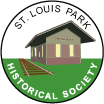Warren Fletcher was born in 1858 in Minnesota; his parents were from Maine and Connecticut. He worked as a teamster at the creosote plant in 1920. His wife Elenora did clerical work at the high school. Daughter Margaret (born 1892) was a teacher at the high school and son Donald was born in 1899.
Donald Fletcher was a plant pathologist. He assisted Nobel Peace Prize winner Dr. Norman Borlaug and Dr. E.C. Stackman at the University of Minnesota in their seed development programs.
Fletcher grew up on his father’s farm located in the area of Miracle Mile. He began school in the old Lincoln School and graduated from St. Louis Park High School. At the University of Minnesota, he received a degree and took graduate work in plant sciences.
The area of stem rust control in wheat, durum and other small grains is where Don Fletcher provided his greatest contribution. In 1922, it was recognized that rust control was very important for the Upper Midwest farmers. The Conference for the Prevention of Grain Rust was found by a group of Minneapolis milling executives, and Don became involved. Through his efforts, more than 600 million rust spreading barbary bushes have been destroyed.
Eliminating the rust spreading barbary was only a small part of the rust program. Don worked with the University of Minnesota scientists who were active in seed development. He helped organize the government and scientists to achieve extensive and needed expansion of research in the breeding and cultivation of crops. Winter tests with two crops per year from Mexico sped the research and put new rust resistant varieties into the hands of farmers years ahead.
Along with many awards he received an honorary doctorate from North Dakota State University, the E.C. Stackman award at the University of Minnesota. He also became a member of the prestigious Cosmos Club in Washington, DC.
By 1960 Don Fletcher was expanding his influence with the Rockefeller Foundation in wheat growing technology to the world; not just Canada and Mexico, but also to India, Pakistan, and the Philippines.
Don Fletcher raised his family and lived his whole life in St. Louis Park. He took an interest in his home town and served for ten years on the school board. He died in 1970.
NOTE:
The 1920 Census reveals that there was another Fletcher family in close proximity that does not appear to be related. Ralph Fletcher lived on Wooddale Ave. (then called Pleasant). [There is also a note that says Vermont.] He was born 1889 and was a truck farmer. His wife Ruth was born in 1888. They had a daughter Elizabeth, born in 1915 and a son Robert, born 1919. Highway 100 was built through his land in the 1930s and put him out of business.
